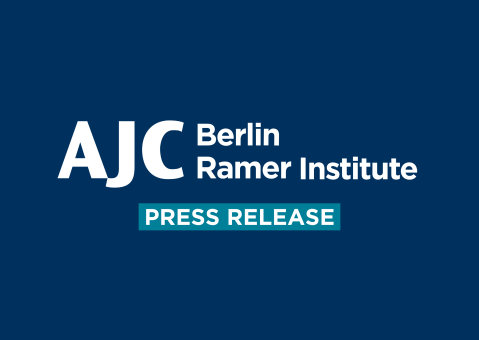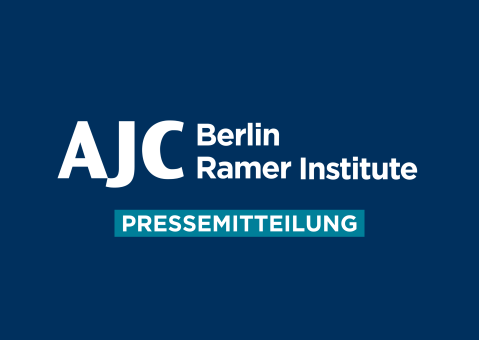Share on
This article first appeared in Belltower News.
Turkish fascists’ hatred of Jews and Israel is not new. However, it became more visible during antisemitic and anti-Israel protests in May 2021.
In mid-May this year, as Israel responded to attacks by the terror organization Hamas, numerous anti-Israel and antisemitic demonstrations took place throughout Germany. Such demonstrations are nothing new, with similar protests having repeatedly occurred in recent years. What was new this year was the highly visible presence of the fascist Turkish Grey Wolves.
On May 12, for example, an unregistered anti-Israeli demonstration took place in front of a synagogue in Gelsenkirchen, which attracted nationwide media attention. On that day, Turkish flags were flying, slogans such as "Shit Jews" chanted, and numerous Grey Wolves were among the demonstrators. The state security services have since opened an investigation. During another incident in May, a Grey Wolves sympathizer attacked a Kurdish demonstrator in Dortmund because he was carrying a flag of the Kurdish People's Protection Units (YPG).
Members and sympathizers at numerous anti-Israel rallies were clearly recognizable by the "wolf salute," formed by hand to mimic the shape of a wolf's head. The organization’s name, as well as salute, have its roots in Turkish mythology: A gray she-wolf who is revered as the savior of Turkishness. This symbol is used by far-right supporters to project the strength and militancy of the movement. In addition to numerous Turkish flags, flags with three crescent moons were ubiquitous at the demonstrations. These symbolize the desired unity of the Turkic peoples in a single nation-state ("Turan") and are intended to show superiority over other nations.
So where does the strong presence of the Gray Wolves at these rallies come from and is it really about the people of Gaza? No.
The Turkish right-wing extremist "Ülkücü movement" emerged from the Turkist or Turanist movements in the early 20th century. In the 1970s, the nationalist ideology was expanded to include Islam. The "Turkish-Islamic Synthesis" is the belief in the inseparability of Turkish nationalist and Islamic components of Turkish history. The Ülkücü movement has always spread antisemitic propaganda. In a study written for AJC Berlin, Professor of Social Sciences Kemal Bozay clearly shows the antisemitic nature of the Grey Wolves' ideology. Extremism expert Claudia Dantschke also emphasizes in her book that antisemitic conspiracy theories are part of the Grey Wolves' canon. Their world view’s central antisemitic stereotype is that Jews have too much economic influence and are behind a global conspiracy. Israel-related antisemitism is of particular importance. The Grey Wolves’ antisemitic incitement at rallies in May was therefore not only unsurprising but was an expression a deep-seated hatred against Jews and the state of Israel.
If one wants to explain this increased visibility at the above-mentioned demonstrations, an essential factor must be included: President Recep Tayyip Erdoğan and his supporters. The Turkish president has repeatedly stirred up resentment towards Jews and Israel in the past. During the corona pandemic, Turkish media and politicians stirred up hatred of Israel by spreading the rumor that the corona virus was a Zionist plot. During May’s escalation in Israel and Gaza, Erdoğan accused Jews of having a murderous nature and reproduced the classic antisemitic child-killer stereotype. In addition to Iran and Qatar, the Turkish government provides significant funding to Hamas in Gaza. The anti-Israeli riots in Germany can therefore also be understood as a consequence of the Turkish president’s antisemitic rhetoric and policies. The fact that Grey Wolves sit in the Turkish government as members of the Nationalist Movement Party (MHP) and the Great Unity Party (BBP) further strengthens the self-confidence of the Grey Wolves in Germany. Erdoğan's internal and external agenda of destabilization is thus bearing fruit in Germany and spurring the movement to make stronger public appearances.
For years, experts have warned of the dangers posed by the Grey Wolves. Supporters are in almost all western German states with a particular presence in North Rhine-Westphalia. The number of active members is estimated to be around 18,000 and the number of sympathizers is likely much higher. Numbers-wise, this makes them one of the largest right-wing extremist groups in Germany with members organized throughout hundreds of local organizations as well as under umbrella organizations like the Federation of Turkish Democratic Idealist in Germany e.V (ADÜTDF/Türk Federasyon), the Union of Turkish-Islamic Cultural Associations in Europe e. V. (ATIB) and the Association of Turkish Cultural Associations in Europe (ATB). To date, neither these associations nor Grey Wolves symbols and propaganda are banned in Germany. Supporters are also trying to garner influence, especially in local politics. But their activities do not stop with local organizations and politics: They incite hatred against all those whom they do not count as part of the Turkish master race, harboring great potential for violence. Members pose a serious threat to minorities, intimidating and violently attacking not only Jews but also Kurds, Armenians, Alevis and Turkish dissidents. In addition, the Grey Wolves deliberately try to silence politicians who speak out against their propaganda, such as the Green politician Cem Özdemir or the left-wing politician Helin Evrim Sommer.
The example of Bilgili Üretmen, who lives in North Rhine-Westphalia and is an important member of the Grey Wolves, shows how successfully the group can spread its propaganda: In recent years, the now highly successful blogger has been able to influence thousands of people in Germany unhindered. He has 32,000 followers on YouTube, over 37,000 on Instagram, and an estimated 50,000 on Facebook. His posts are mostly in German, agitating against Germany's Turkey policy, downplaying antisemitic incidents in the wake of anti-Israel protests, and openly displaying the wolf salute. Such political influencers primarily reach out to teenagers and young adults who do not use traditional media to inform themselves politically.
The parallels to German right-wing extremism are obvious: The Grey Wolves are anti-democratic, violent, racist, antisemitic, mysoginistic, homophobic, and spread conspiracy theories -- just like other right-wing extremist groups. Continued ignorance of this group and its potential danger is incomprehensible. The potential for their mobilization is enormous, not only in Germany but throughout the European Union. Its influence on people of Turkish origin living in Europe is continuously growing. The more extreme Erdoğan's contempt for democracy and political radicalization becomes, the more clearly the consequences are felt in German society.
The influence of Turkish state propaganda through influencers like Üretmen could be stemmed by deplatforming. However, such efforts have failed to materialize.
To date, there are hardly any prevention and deradicalization projects aimed specifically at Grey Wolves members and sympathizers, despite experts long calling for the German government to create programs and fund long-term projects.
There are no easy solutions in the fight against right-wing extremism -- and certainly no quick fixes. For this very reason, diverse sets of long-term strategies must immediately be developed and implemented to counter the influence of the Grey Wolves in Germany. Those who view banning organizations as unworkable must seek other solutions. The shoulder shrugging to date towards this phenomenon is insufficient and is unbearable for all those who are the targets of the Turkish fascists’ inhumane ideology.
Mona Flaskamp is Assistant Director for Political Affairs at American Jewish Committee (AJC) Berlin and works on issues of antisemitism, right-wing extremism and Islamism.



